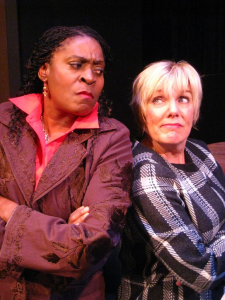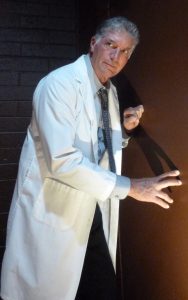Vantage Makes Itself at Home with Good ‘Rasheeda Speaking’
Vantage Theatre does things a little different around these parts – the company doesn’t conceive plays for a season so much as exploit seasonable plays. The La Jolla-based troupe strikes when its iron is hot, addressing timely big-ticket issues at sites specific to the topic.
Its Cadenza: Mozart’s Last Year used part of Balboa Park’s Timken Museum of Art as Wolfgang’s apartment; and what better place for last year’s play on counterculture figure Ram Dass than breezy, caution-to-the-wind little Ocean Beach!
Comes now its Rasheeda Speaking, a comedy centering on race, friendship and backdoor politics in an apparently unlikely venue — a doctor’s office. This is a pretty good show on a topic admittedly done to death from all sides, owing to playwright Joel Drake Johnson’s clear-as-a-bell dialogues and savvy coaching by directors and company founders Dori Salois and Robert Salerno.

Jaclyn (Milena Phillips, left) is itching to butt heads (again) with mild-mannered manager Ileen (Dori Salois). COURTESY PHOTOS
We soon may be seeing more at that site from this always-interesting company – more about that in a second. For now, let’s look at the issues Rasheeda raises and how La Jolla became the company’s focus.
Jaclyn’s eccentric side has pretty much taken over by the time we meet her. This Chicago medical secretary has been in and out of jobs once too often, owing to her supersensitivities and her incessant braying — on the air she breathes, on the whereabouts of the office paper holer, on the dust on the floor and, notably, on the fact that she’s black (“Rasheeda,” in fact, is a euphemism here for all middle-aged black women, used by white-collar whites in a sucky attempt at racist humor).
Her pain-in-the-ass personality is hot one minute and cold the next, to Dr. Williams’ and office manager Ileen’s chagrins — but she’s on to something when she suspects that the white guys in corporate have been discussing her termination.
The play’s final minutes level quite a surprise in the person of Rose, an otherwise unobtrusive patient who may be sicker than she looks. Her mild eleventh-hour curiosity fuels our speculation about what’s come before, not the least of which is Jaclyn’s own racism (listen to her shifty speech about her Mexican neighbor), her pointless rhetoric about remuneration for slavery and her apparent savvy in the ways of employment law.

Dr. WIlliams (Steve Oliver) lets his wan expression speak for itself.
Meanwhile, where did Vantage find Phillips, whose Jaclyn is at once so collegial and calculating at the drop of a hat? Phillips is very, very good in a role whose subtleties make it harder than it looks. Salois’ Ileen is a consummate giver, probably to a fault — and the actor articulates Ileen’s pushover side quite believably. Oliver got off to a slow start with Williams as he listened to his own recitations; this cleared up with time, and Oliver’s rangy physique also fueled his disposition to the part. June Gottlieb is cast well to type as Rose, whose critical revelation at the end makes her role in some ways the most important of all.
The tech effort is all right here, save for one drawback: The venue’s relatively tiny stage surface does constrict not only the actors’ movements but also the anecdotes Salerno and Salois might have played out but for the short porch. This will surely have a bearing on future shows there, at least as far as the number of approachable pieces.
‘The people who need to hear the story are the ones that think otherwise.’
— Dori Salois
Some (like me) may argue that as we give racism our attention, we necessarily stoke the negatives of our past, on which less-than-flexible minds may dwell (that’s one reason, for example, I’m wary of Black History Month). Nonetheless, the issue has been around all over the globe since God was about 3, and it sticks in the public mind for a reason. For better or worse, Vantage has met the challenge, and, as mentioned, the troupe may do it again in La Jolla sooner than you think.
Congregational Church is celebrating its 100th anniversary in La Jolla and seeks to energize itself accordingly – enter Vantage and another local company called Different Stages, whose presences have so far filled the requirement. Different Stages is mounting The Duck Variations, David Mamet’s play about life, love and ducks and stuff, at the same space on the same dates (see below).
“We think it’s a good partnership,” Salois said. [Church personnel] understand that this piece fits with the community. They’re vibrant, and they have good outreach. We go where the need to hear a story is greatest, and that’s why we’re doing it here.
“The people who need to hear the story,” she concluded, “are the ones that think otherwise.”
This review is based on the performance of Feb. 20. Rasheeda Speaking runs through March 6 at La Jolla Commons Theatre, 1216 Cave St. David Mamet’s The Duck Variations runs on the same bill (pun intended). $20 for one play, $30 for both. 858-859-2281, vantagetheatre.com.

Martin Jones Westlin, principal at editorial consultancy Words Are Not Enough and La Jolla Village News editor emeritus, has been a theater critic and editor/writer for 25 of his 47 years…
More…
